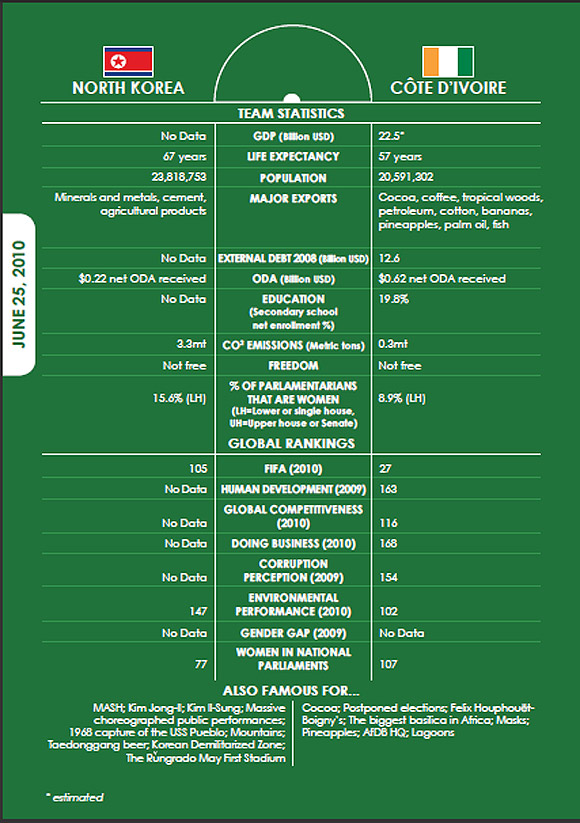The Africa Progress Panel, chaired by former UN Secretary-General Kofi Annan, has prepared a football-inspired guide to illustrate key development issues between countries competing in the World Cup.
Championed by UNDP Goodwill Ambassador, Didier Drogba, the guide provides a brief overview of the relationship or “match history” between competitors in selected games.
We brought you the off-the-field dynamics between Cameroon and Denmark for Thursday’s game. Friday sees North Korea face off against Côte d’Ivoire in Nelspruit.
As Drogba and Anan write in the foreword: “Players and fans, whether from Midrand, Manila, Manchester or Montevideo, all understand the importance of fair play and an impartial referee.
“We passionately believe that this understanding should not be limited to the way countries play, run and score against each other, but also the way they do business and politics with each other; that the spirit of the World Cup should extend into countries’ economic and political relations; that the celebration of our common humanity should not be limited to one month every four years.”
BRAZIL-CÔTE D’IVOIRE
 Game plan
Game plan
Attempts on target
Education: The government of North Korea places great importance on centralized education. This has resulted in a very high literacy rate (nearly 100%) and places the country in the global top ten when it comes to combined gross enrolment ration. (Source: UNSTATS Key Findings of 2008 Census)
Peace and National Stability: Côte d’Ivoire’s civil war officially ended in 2007, with a peace agreement and the creation of a transitional government of national unity. Although fighting has ceased, and elections have been postponed several times, the country’s situation has improved.
Attempts off target
Development: Both North Korea and Côte d’Ivoire are significantly off target to achieve most of the Millennium Development Goals. While in Côte d’Ivoire the situation is particularly tragic when it comes to extreme poverty and health, North Korea lags far behind in combating hunger. Both countries are among the world’s worst performers when it comes to women’s empowerment and gender equality. (Source:MDG Monitor)
Governance: Both countries suffer from substantial governance deficits. In North Korea, the eccentric leader Kim Jong-Il has followed in the foot-steps of his father to marginalize the country both economically and politically. In Côte d’Ivoire, President Laurent Gbagbo has repeatedly postponed the holding of elections, most recently in April 2010, even though his term of office originally expired in 2005.
Food Security: Both countries are experiencing severe food insecurity. In North Korea, lack of arable land, insufficient investment in agriculture and have left more than 8.2 million people in need of food assistance. In Côte d’Ivoire, the protracted political crisis, the large number of internally displaced people and the de facto division of the country continue to limit the availability of and access to food of large parts of the population. (Sources: World Food Programme Country Report 2010, World Food Programme Country Report 2010)
National Unity: Both countries face substantial divisions with North Korea having been separated from South Korea for over 50 years and Côte d’Ivoire being divided in two by a demilitarized zone since the civil war which started in 2002.
Fouls
Sanctions: Both Côte d’Ivoire and North Korea are subject to international sanctions, albeit to very different degrees and for very different reasons. Côte d’Ivoire, for example, is under sanctions when it comes to EU’s import ban on diamonds, ban on exports of equipment for internal repression, embargo on arms and related materiel and freezing of funds and economic resources of certain persons who constitute a threat to the peace and national reconciliation process in Côte d’Ivoire.
North Korea is facing similar sanctions, with some additions such as the embargo on certain goods and technologies which could contribute to North Korea’s nuclear-related, missile-related or other weapons of mass destruction-related programs. (Source: European Commission: External Relations – Restrictive measures in force)
 Comparing the teams’ vital stats
Comparing the teams’ vital stats